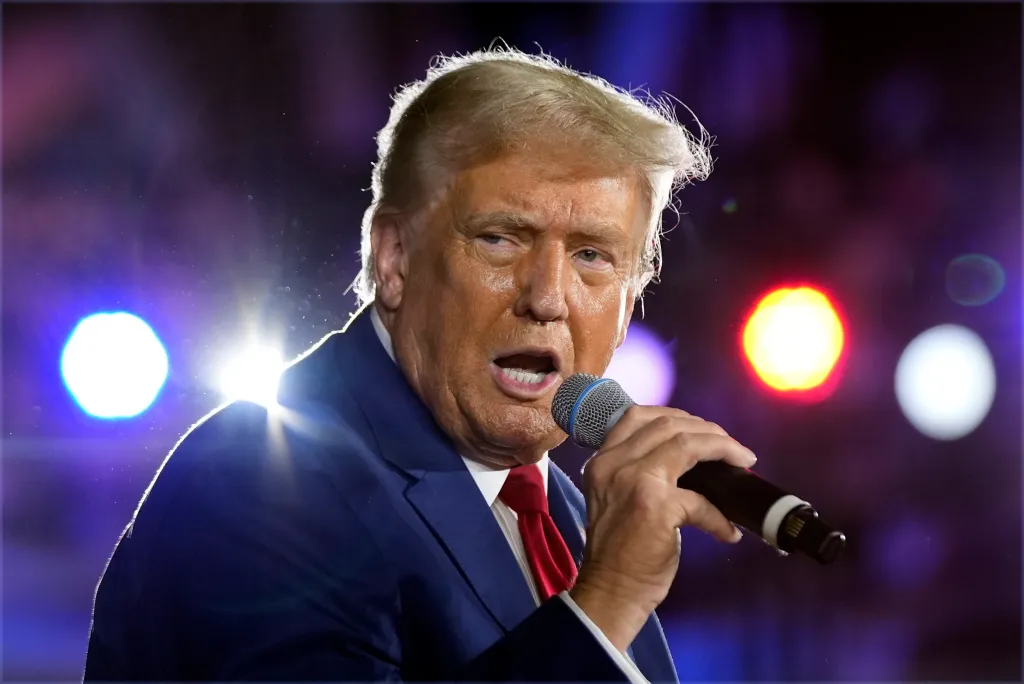Donald Trump will hold a headline-grabbing rally at New York’s Madison Square Garden stadium Sunday, an iconic sports and music venue that has a history of hosting political conventions—but was also tainted by an infamous 1930s Nazi assembly.
The choice is a classic Trump flex, an opportunity to fill a 20,000-seat stadium dubbed “The World’s Most Famous Arena” in the city where he first made his name as a real estate tycoon with a playboy lifestyle.
The rally at Madison Square Garden, which has changed locations since the 1930s, underscores Trump’s bold claim that he could even flip solidly Democratic New York into the Republican camp on November 5.
That is almost certainly unlikely, but as the final days of the unprecedented campaign tick down, Trump knows he is at least guaranteed intensive coverage in the nation’s media capital, as well as a spectacular stage to deliver his closing argument.
The Rolling Stones, Madonna, and U2 are among the big names who played “the Garden,” which has also been chosen for several Democratic and Republican presidential conventions over the decades.
However, the venue’s association with the far-right Bund that hosted a rally in 1939, complete with eagles, Nazi insignia, and Hitler salutes, will generate darker headlines.
Some 20,000 US-based Nazi sympathizers gathered under the banner of “Americanization,” denouncing Jewish “conspiracies” and then-president Franklin D. Roosevelt, sparking fierce counter-protests outside.
Trump will be appearing just days after one of his former presidential chiefs of staff, retired general John Kelly, said the Republican fits the definition of a fascist—something Harris said she agreed within a live CNN event this week.
The Atlantic magazine has also reported that while president, Trump complained about US top brass, declaring “I need the kind of generals that Hitler had.”
Trump denies making such remarks, and his top congressional allies on Friday accused Harris of fomenting violence—even if Trump has consistently called her everything from “fascist” to “Marxist” and a variety of profanities.
Trump’s opponents are pouncing on the historical echoes, noting that Trump has suggested he would act like a dictator on “day one” if elected and said he could use the US military to go after the “enemy within.”
“One of the things you’ll see… is Trump actually reenacting the Madison Square Garden rally in 1939,” Hillary Clinton, whom Trump beat in the 2016 election, told CNN.
“Roosevelt was appalled that neo-Nazis, fascists in America were lining up essentially to pledge their support for the kind of government they were seeing in Germany,” Clinton said.
“It may be a leap for some people, and a lot of voters may think ‘I don’t wanna go there,’” she said. “But please, open your eyes to the danger this man poses to our country.”
Trump has repeatedly embraced far-right rhetoric and has built his election campaign around promises of unprecedented deportations of undocumented migrants, whom he has called “vermin” who are “poisoning the blood of our country.”
He drew fire as far back as 2017, at the start of his presidency, when he said there were “very fine people on both sides” of an ugly clash between white nationalist neo-Nazis in Charlottesville, Virginia, and protesters—one of whom was killed.
Later in the same remarks, Trump went on to say that extremists should “be condemned totally. But you had many people in that group other than neo-Nazis and white nationalists.”
Trump will likely brush away any controversy and use his Sunday night in the Garden moment to bask on a stage that has previously hosted celebrities as varied as Muhammad Ali, two popes, Frank Sinatra, and Marilyn Monroe.
Trump already got one hometown boost on Friday—the endorsement of the city’s Rupert Murdoch-owned, best-selling tabloid, the New York Post.
“THANKS FOR THE WONDERFUL ENDORSEMENT!!!” Trump wrote on his Truth Social platform.




